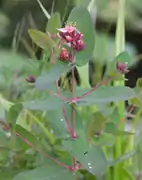Hypericum virginicum
Hypericum virginicum (Triadenum virginicum), the marsh St. Johns-wort[2] or Virginia marsh St. Johnswort,[3] is a species of flowering plant in the family Hypericaceae.[1] It is native to the central and eastern United States and eastern Canada.[1]
| Hypericum virginicum | |
|---|---|
 | |
| Scientific classification | |
| Kingdom: | Plantae |
| Clade: | Tracheophytes |
| Clade: | Angiosperms |
| Clade: | Eudicots |
| Clade: | Rosids |
| Order: | Malpighiales |
| Family: | Hypericaceae |
| Genus: | Hypericum |
| Section: | Hypericum sect. Elodea |
| Species: | H. virginicum |
| Binomial name | |
| Hypericum virginicum L.[1] | |
| Synonyms[1] | |
|
List
| |
Hypericum virginicum is a small herbaceous plant growing up to 70 cm (28 in) in height.[4] Its leaves are sessile and opposite, sometimes clasping. The flowers grow up to 15 mm (0.6 in) in diameter, with 5 pink petals.[4] It flowers in the summer to early fall and grows in bogs, wet meadows, fens, swamps, and along lakeshores.[2][4] It can be distinguished from the closely related Hypericum fraseri by its longer, acute sepals, and longer styles.[2]
It was originally described as Hypericum virginicum L. in 1759, but long considered a member of a separate genus, Triadenum.[5][6]
 Close-up of the flower
Close-up of the flower
References
- "Triadenum virginicum (L.) Raf". Plants of the World Online. Royal Botanical Gardens Kew. Retrieved 2019-01-02.
- Reznicek, A. A.; Voss, E. G.; Walters, B. S., eds. (February 2011). "Triadenum virginicum". Michigan Flora Online. University of Michigan Herbarium.
- "Triadenum virginicum". Natural Resources Conservation Service PLANTS Database. USDA. Retrieved 2 January 2019.
- Flora of North America Editorial Committee, ed. (2015). "Triadenum virginicum". Flora of North America North of Mexico (FNA). 6. New York and Oxford. Retrieved 2 January 2019 – via eFloras.org, Missouri Botanical Garden, St. Louis, MO & Harvard University Herbaria, Cambridge, MA.
- "Triadenum virginicum (L.) Raf". ipni.org. International Plant Names Index. Retrieved 2019-01-02.
- "Hypericum virginicum L." ipni.org. International Plant Names Index. Retrieved 2019-01-02.